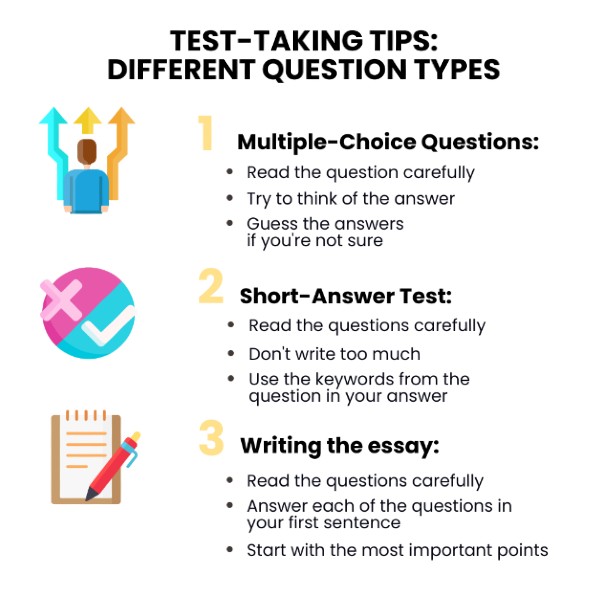Are you dreading your upcoming test because you feel unprepared? Or are you simply looking to refresh and improve your test-taking skills?
In this article by Custom-Writing.org experts, you’ll find a collection of excellent test-taking tips and strategies. Even if you only have one day to prepare for your test, you’re sure to use some of them.
1. 📅 Test-Taking Strategies: Planning
2. 🤓 Test-Taking Tips: Preparing for the Test
3. ❓ Test-Taking Tips: Different Types of Questions
If your test includes a mix of different question types, make sure you prepare for them, and learn strategies to help you with each one. Even if it’s a learning style test that doesn’t need any real preparation, you still need to know what to expect from it.

3.1. Test-taking Tips for a Multiple-choice Test
- Read the questions carefully. Check whether each asks you to choose one or multiple answers.
- Try to think of the answer to the question. Do that before looking at the options. It will help you make sure that the other options don’t influence your response.
- Guess the answers if you’re not sure. Don’t forget to take a little mark next to the question so that you can recheck it if you have time.
3.2. Test-taking Tips for a Short-answer Test
- Read the questions carefully. Underline the keywords (e.g., define, compare, analyze, argue, etc.).
- Don’t write more than you need to answer the question. But if you think your answer may not be precise enough, add a little more to make sure that you get your point across.
- Use the keywords from the question in your answer.
3.2. Test-taking Tips for an Essay Test
- Read the questions carefully. Then write down a rough outline. It will help you stay on track and avoid including unnecessary information.
- Answer each of the questions in your first sentence. Then provide supporting evidence to support your answer. Don’t start writing before you have a clear idea of your answer.
- Start with the most important points first. This is especially important if you’re running out of time.
- Double-space. You need space to edit your answer afterward if you notice mistakes or want to add something.
4. 🌚 Test-Taking Tips: the Night Before the Test
5. ✍️ Best Tips for Taking the Test
6. 🔚 Test-Taking Tips: After the Test
- Take note of how you can improve next time. After the test, while it’s still fresh in your mind, think about what you can do differently next time.
- Celebrate! After all of that hard work, take some time to relax and celebrate with your friends and family. You may not have much time to celebrate just yet if you have more tests, but remember to take a break before you start preparing for the next one, especially if you have another one the next day.
Good luck with your tests! We hope you found these test-taking tips useful and that they help to reduce some of your stress. If you have any tips to add, please share them in the comments.

![Left Brain vs. Right Brain: Characteristics Chart [INFOGRAPHIC]](https://custom-writing.org/blog/wp-content/uploads/2020/12/left-right-brain-concept-284x153.jpg)










![200 Powerful Words to Use Instead of “Good” [Infographic]](https://custom-writing.org/blog/wp-content/uploads/2020/12/portrait-fair-haired-beautiful-female-woman-with-broad-smile-284x153.jpg)